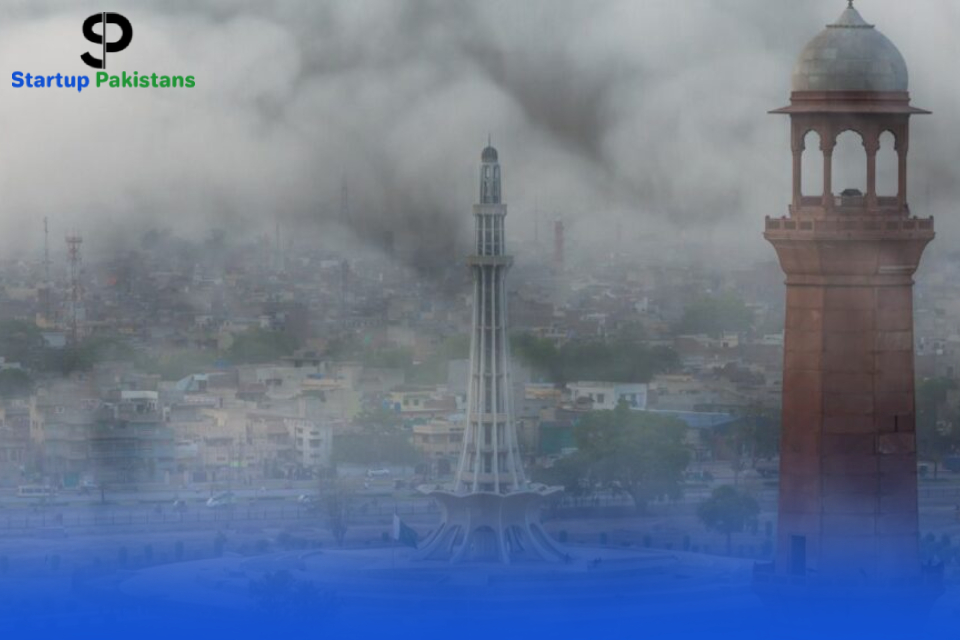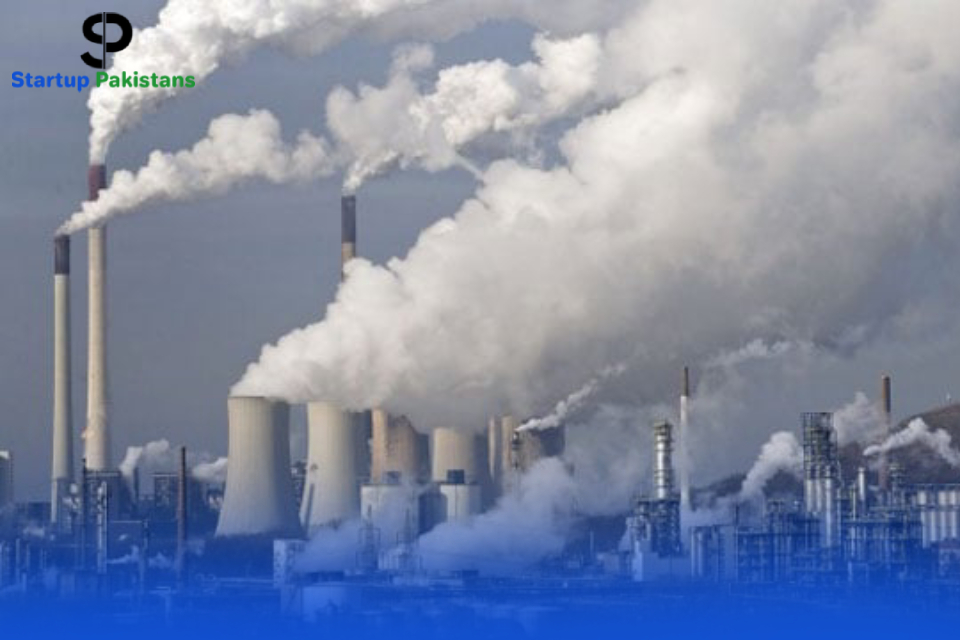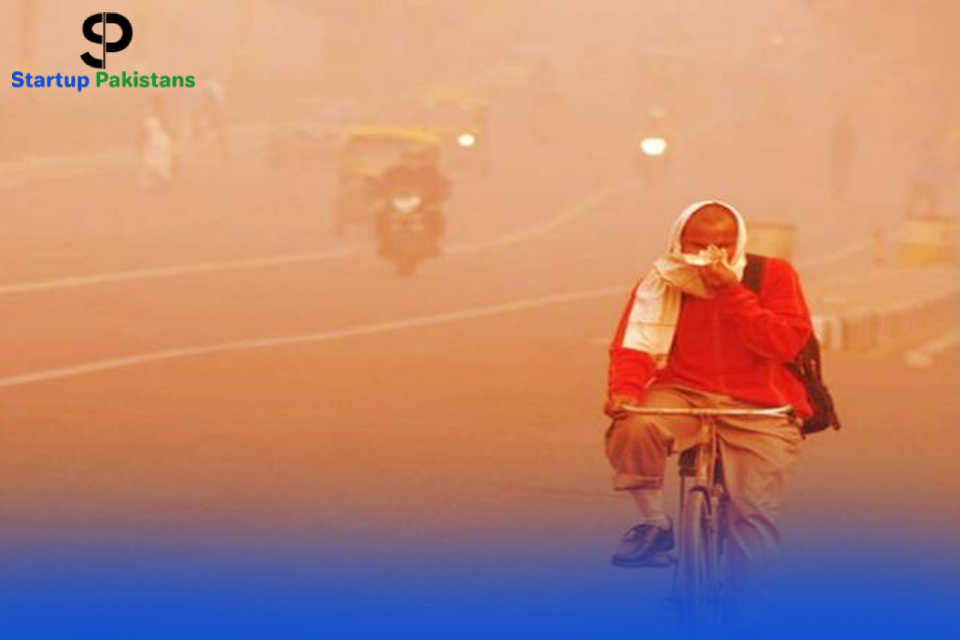Due to its swift industrialization and urbanization, Pakistan has been facing serious air pollution issues that substantially threaten public health and the environment. The increased emissions of air pollutants from various sources, such as factories, power plants, vehicles, and solid waste burning, have resulted in deteriorating air quality and alarming consequences.
Environmental Impacts of Air Pollution
The effects of air pollution on the environment are extensive. Its role in global climate change is one of its main effects. When greenhouse gases, like methane and carbon dioxide, are released into the atmosphere, they trap heat, causing temperature increases, ice caps to melt, and extreme weather to occur.
Moreover, air pollution harms biodiversity and ecosystems. A decrease in the number of plant and animal species can result from pollutants upsetting delicate ecosystems’ delicate balances. Acid rain, which brings on pollutants like sulfur dioxide and nitrogen dioxide, negatively impacts the health of plants, animals, and aquatic life. Acid rain also damages rivers, lakes, and forests.
Air pollution has a negative impact on agriculture as well. Pollutants can settle on crops, slowing growth and decreasing yields. This not only has an impact on food security but also costs farmers money. Moreover, air pollution can contaminate water bodies, endangering aquatic life and rendering them unfit for human consumption.
Impacts of Air Pollution on Health
It is impossible to overestimate the effects of air pollution on human health. Exposure to particulate matter, nitrogen dioxide, sulfur dioxide, and volatile organic compounds has been linked to various health issues.
Respiratory disease is one of the most common health problems caused by air pollution. Pollutant inhalation can cause respiratory inflammation and irritation, exacerbating conditions such as asthma and chronic obstructive pulmonary disease (COPD). Lung cancer risk has also been connected to long-term exposure to air pollution.

The effects of air pollution go beyond respiratory issues. It may also have effects on the heart, according to studies. When fine particulate matter gets into the bloodstream, it can cause oxidative stress and inflammation, both of which are factors in heart disease, stroke, and other cardiovascular disorders. In highly populated areas with elevated pollution levels, the effects of air pollution on cardiovascular health are especially worrisome.
Furthermore, air pollution may negatively impact the general state of well-being. It has been linked to a number of cognitive deficits, such as diminished cognitive function and a higher chance of developing neurodegenerative illnesses like Parkinson’s and Alzheimer’s. Furthermore, poor birth outcomes like low birth weight and developmental problems in the offspring can result from pregnant women’s exposure to air pollution.
Air Pollution Statistics in Pakistan
The air pollution levels in Pakistan are alarming. As per the World Air Quality Index (AQI), a number of cities nationwide consistently face dangerously high levels of air pollution. Pakistan’s second-biggest city, Lahore, is frequently listed among the world’s most polluted cities.
In Pakistan, particulate matter (PM), sulfur dioxide (SO2), nitrogen dioxide (NO2), and volatile organic compounds (VOCs) are the primary pollutants of concern. The main sources of these pollutants’ emissions are burning fossil fuels, automobile exhaust, and industrial processes. The nation’s high air pollution levels are a result of a combination of factors, including fast urbanization, insufficient emission control measures, and low public awareness.

Causes of Air Pollution in Pakistan
In Pakistan, there are several factors that lead to air pollution. One of the major contributors is industrial emissions. The rapid growth of industries, particularly in urban areas, has resulted in increased emissions of harmful pollutants. Manufacturing, power generation, and chemical production all emit pollutants into the atmosphere, contributing to the deterioration of air quality.
The emissions from moving vehicles are a major source of air pollution. More cars are on the road, which, combined with antiquated emission control regulations and subpar fuel, causes a significant amount of pollutants into the atmosphere. Traffic congestion in large cities worsens the issue because cars produce pollution when they are idle or traveling slowly. In Pakistan, burning solid waste is another significant cause of air pollution. Poor waste management techniques release particles and hazardous gases into the atmosphere, such as burning garbage outdoors. This releases dangerous substances into the atmosphere, endangering public health in addition to contributing to air pollution.
Government Initiatives to Combat Air Pollution
The Pakistani government has launched a number of programs to reduce air pollution and enhance the quality of the air. These include the implementation of vehicle emission regulations, the encouragement of cleaner fuels, and the creation of national and local environmental protection organizations.
In an effort to lessen dependency on fossil fuels, the government has also put policies in place to promote the use of renewable energy sources like solar and wind power. Furthermore, initiatives have been undertaken to enhance waste management procedures, such as developing waste-to-energy facilities and encouraging recycling.
To combat air pollution effectively more must be done to enforce the current regulations and introduce new ones. Cooperation between the public, businesses, and government is essential to solve this urgent issue.

Steps Individuals Can Take to Reduce Air Pollution
While government actions are essential, individuals can also play a significant role in reducing air pollution. Here are some steps that individuals can take:
- Reduce the use of private vehicles: Opt for public transportation, carpooling, or cycling whenever possible to minimize vehicular emissions.
- Support clean energy: Use renewable energy sources like solar panels for electricity generation at home. Encourage the use of clean energy in communities and support initiatives that promote renewable energy.
- Conserve energy: Use energy-efficient appliances, turn off lights and electronics when not in use, and insulate homes to reduce energy consumption. This helps to reduce the demand for fossil fuels, which are major contributors to air pollution.
- Practice proper waste management: Segregate waste at home and dispose of it responsibly. Avoid burning waste, as it releases harmful pollutants into the air. Support recycling initiatives and promote awareness about the importance of waste management.
- Plant trees and create green spaces: Trees absorb carbon dioxide and release oxygen, helping to improve air quality. Planting trees in urban areas and creating green spaces can make a significant difference in reducing air pollution.
The Role of Industries in Reducing Air Pollution
Industries are essential in reducing air pollution. In order to come up with creative solutions, they can invest in research and development, put emission control measures in place, and embrace cleaner production technologies. Through the implementation of environmental considerations and a sustainability agenda, industries can reduce their carbon footprint and promote cleaner air.
Governments can also encourage the adoption of cleaner technologies in industry by offering grants, tax breaks, and other financial rewards. Cooperation between businesses, governments, and environmental organizations is crucial to accelerate the shift to greener and more sustainable industrial practices.

The Importance of Public Awareness and Education
Public education and awareness are critical to combating air pollution. People can take action to lessen their personal contribution to the issue and make educated decisions by learning about the causes and effects of air pollution.
In order to promote sustainable practices and increase public awareness of air pollution, schools, colleges, and community organizations can make a significant. People can be empowered to take action to protect the environment and themselves by participating in campaigns and workshops that inform them of the health risks linked to air pollution.

Conclusion
Pakistan’s sustainable development depends on addressing the air pollution problem. Air pollution seriously affects the environment and human health, which calls for quick attention and action.
Pakistan can reduce the negative effects of air pollution on the environment and public health by implementing efficient policies, investing in clean technologies, and launching public awareness campaigns. Adopting cleaner and more sustainable practices requires a concerted effort from the public, businesses, and government and stricter enforcement of regulations.
Each person can contribute to the reduction of air pollution. We can contribute to cleaner air and a healthier future for our nation by making thoughtful decisions like taking public transportation, saving energy, and managing waste properly.
Let’s work together to make Pakistan healthier and cleaner. It is time to take action.
Author:
This Article is written and Researched by Mujeeb UR Rehman, a Certified Marketing and Communications Professional from IBMI Berlin, Germany.



 Ultimate Guide to Skincare: Expert Tips for Beautiful Skin Care 2023
Ultimate Guide to Skincare: Expert Tips for Beautiful Skin Care 2023